There is a wealth of information on the web that you probably want to keep up to date with; from news to how-tos, guides, tutorials, and more. Imagine having to visit, on a daily basis, all your favorite blogs or websites – it’s a bit of a challenge, especially if you have a tight schedule. This is where RSS comes into play.
RSS (Rich Site Summary or also Really Simple Syndication) is a popular and standardized web format used to deliver regularly changing content on the web. It is employed by blogs, news-related sites as well as other sites to deliver their content as an RSS Feed to Internet users interested in it.
RSS feeds enable you to see when blogs or websites have added new content so you can get the latest headlines, videos, and images within a single interface, immediately after being published, without necessarily visiting the news sources (you have taken the feeds from).
To subscribe to a feed, simply go to your favorite blog or site, copy the RSS URL, and paste it into your RSS feed reader: do this for sites you visit frequently.
For example, the Tecmint.com RSS feed URL is:
https://www.tecmint.com/feed/
In this article, we will review 17 RSS Feed readers for Linux systems. The list is not arranged in any particular order.
1. NewsFlash
NewsFlash is a program that works together with your online RSS reader. It brings together the convenience of web-based services, allowing you to sync your content across different devices.
At the same time, it provides the features you’d expect from a desktop program, such as desktop notifications, quick search and filtering, tagging, useful keyboard shortcuts, and the ability to access all your articles for as long as you want.
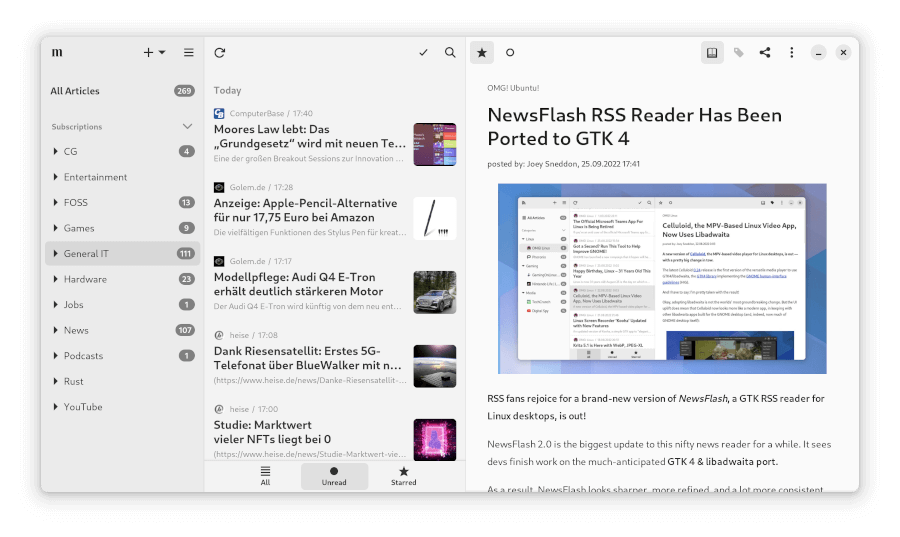
To install NewsFlash on your system, you can use either Snap or Flatpak. Choose one of these options to install the program on your system.
sudo snap install newsflash OR flatpak install flathub io.gitlab.news_flash.NewsFlash flatpak run io.gitlab.news_flash.NewsFlash
2. RSSowl
RSSowl is a free, powerful, cross-platform desktop RSS feed reader that runs on Linux, Windows, and macOS. It helps you to organize your feeds the way you want, under various categories, and instantly search, and read feeds conveniently.
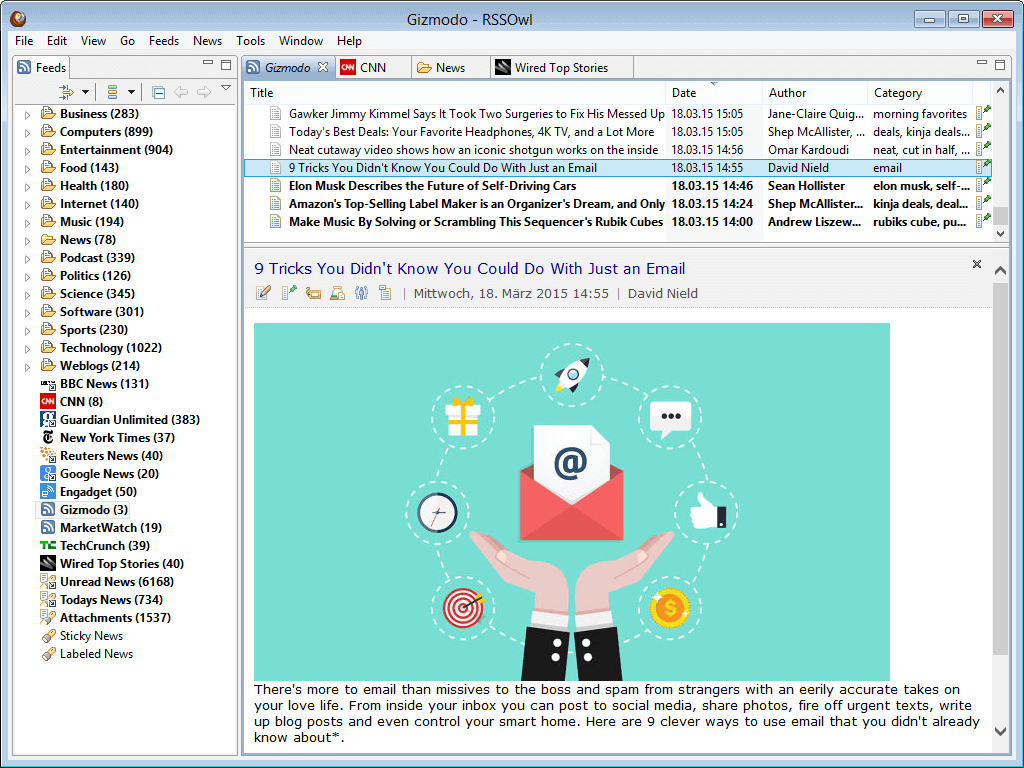
It allows you to save searches and use them like feeds and supports notifications. It also offers news bins for storing news entries that you consider very important. RSSowl also supports labels for associating keywords with news entries and more.
To install RSSOwl on a Linux system, you should download the ZIP file, extract its contents, and then run the application.
unzip RSSOwl.*.Linux-x64.zip cd rssowl/ ./RSSOwl
3. TinyTiny RSS
Tiny Tiny RSS is a free open-source web-based RSS/Atom reader and aggregator, powered by AJAX that allows users to subscribe to various news sources, blogs, and other content websites and consolidates the updates into a single, customizable web interface.
TT-RSS is designed to be self-hosted, meaning users can set it up on their servers under Docker and access it through an easy-to-use web interface on their desktop, your mobile browser, or using one of the available apps.
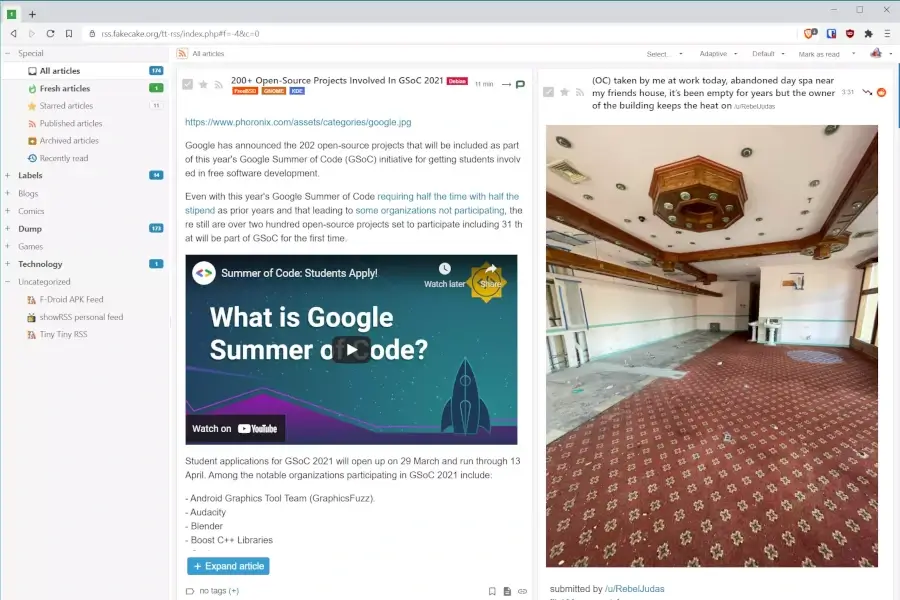
It supports keyboard shortcuts, and several languages and allows for feed aggregation/syndication. TT RSS also supports podcasts and allows you to share new entries in various ways including via RSS feeds, social networks, or sharing by URL, and many more.
It supports flexible article filtering and automatically identifies and filters duplicate articles. It comes with multiple themes to customize its look and feel, and there are plugins to extend its core functionality.
You can integrate it with external applications via a JSON-based API. In addition, it supports OPML import/export and more.
4. Akregator
Akregator is a very powerful news RSS/Atom feed reader for KDE, designed to get feeds from hundreds of news sources. It is easy to use and very convenient.
It ships with an embedded browser for reading news simply and conveniently and can be integrated with Konqueror to add news feeds.
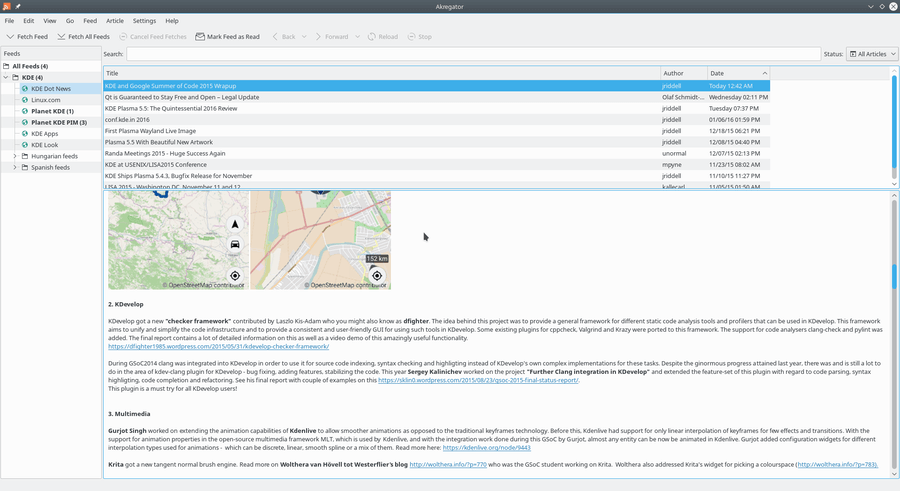
If you are using a KDE desktop, most likely Akregator is already installed. If not, you can use the following command to install it.
sudo apt install akregator [On Debian, Ubuntu and Mint] sudo yum install akregator [On RHEL/CentOS/Fedora and Rocky/AlmaLinux] sudo emerge -a sys-apps/akregator [On Gentoo Linux] sudo apk add akregator [On Alpine Linux] sudo pacman -S akregator [On Arch Linux] sudo zypper install akregator [On OpenSUSE]
5. FreshRSS
FreshRSS is a free open-source, fast, lightweight, powerful, and customizable web-based RSS feed reader and aggregator. It is a multi-user application and has a terminal interface for those who like to work from the command line.
To self-host it, all you need is to install a LAMP or LEMP stack on your system.
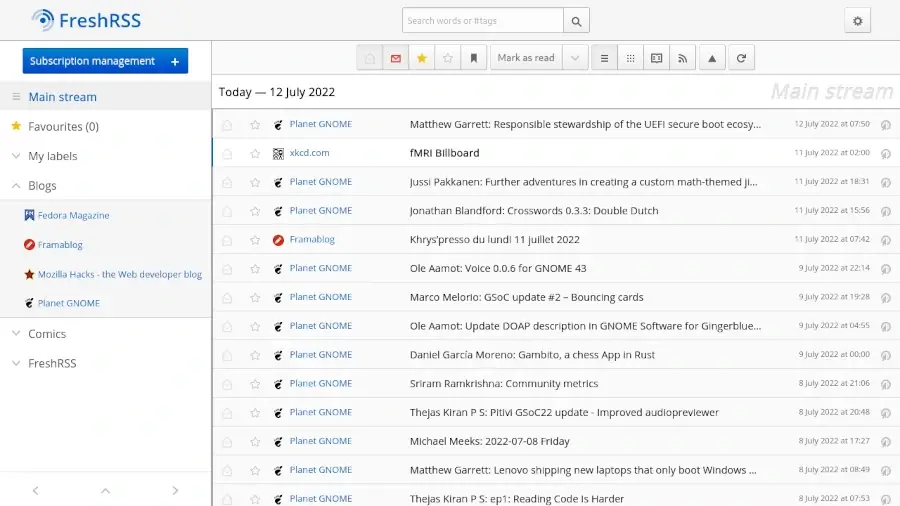
It is easy to use, very responsive with good mobile support. FressRSS supports anonymous reading mode, and instant notifications from compatible sites, via PubSubHubbub. It comes with various extensions to improve its core functionality and an API for (mobile) clients.
6. Selfoss
Selfoss is a free open source, modern, lightweight, and multipurpose web-based RSS reader, developed using PHP (therefore self-hostable). It can also be used for live streams, mashups, and as a universal aggregation.
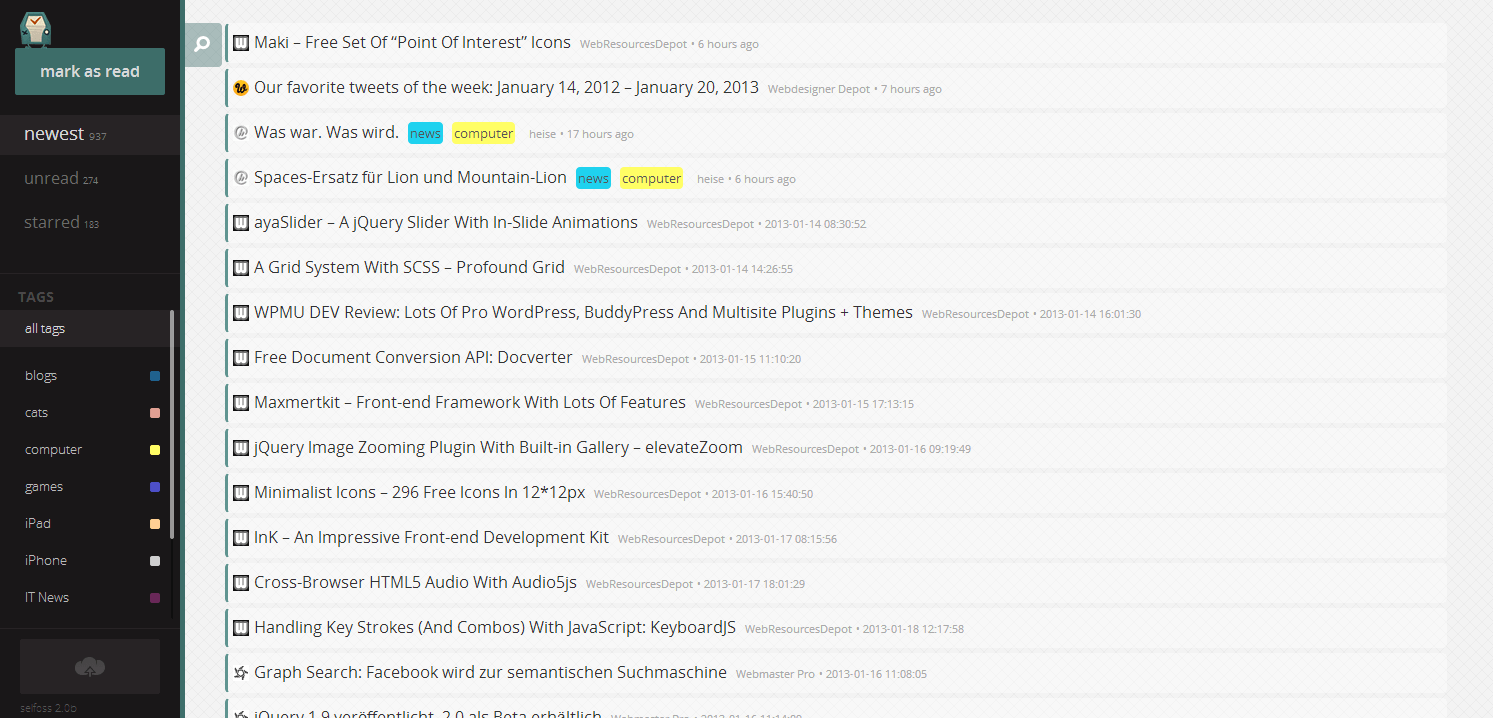
It comes with amazing mobile support (apps) for Android, iOS, and tablets. It supports plugins for further tuning, and it also supports OPML import. In addition, you can integrate it with other external applications or develop your plugins with the help of a Restful JSON API.
7. QuiteRSS
QuiteRSS is a free open-source, cross-platform, and feature-rich RSS feed reader. It works on Linux, Windows, and macOS. It comes in a multitude of languages around the world. It automatically updates news feeds on startup and via a timer.
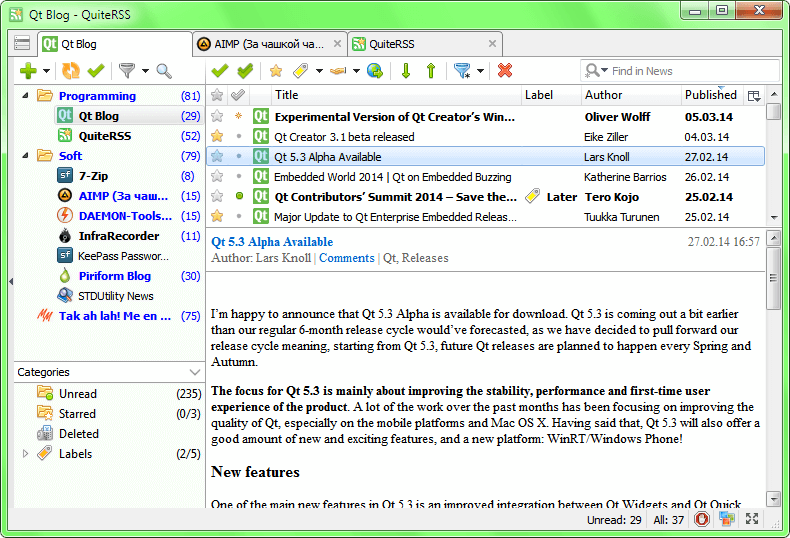
QuiteRSS supports shortcuts, OPML import/export, a quick search in the browser, and filters (user, feed, and news filters). It also supports notifications (pop-up and sound) and displays new or unread news counters on your system tray.
If you don’t want to view images in preview, this application allows you to disable them. For security-minded users, it allows you to configure a proxy either automatically or manually. It also comes with an ad-lock, an internal browser and so much more.
To install QuiteRSS on Linux, use the following appropriate command for your specific Linux distribution.
sudo apt install quiterss [On Debian, Ubuntu and Mint] sudo yum install quiterss [On RHEL/CentOS/Fedora and Rocky/AlmaLinux] sudo emerge -a sys-apps/quiterss [On Gentoo Linux] sudo apk add quiterss [On Alpine Linux] sudo pacman -S quiterss [On Arch Linux] sudo zypper install quiterss [On OpenSUSE]
8. Liferea (Linux Feed Reader)
Liferea is a free open-source, web-based feed reader and news aggregator for Linux. It is considered one of the best RSS feed readers on Ubuntu Linux. It has a simple interface that allows you to easily organize and browse feeds.
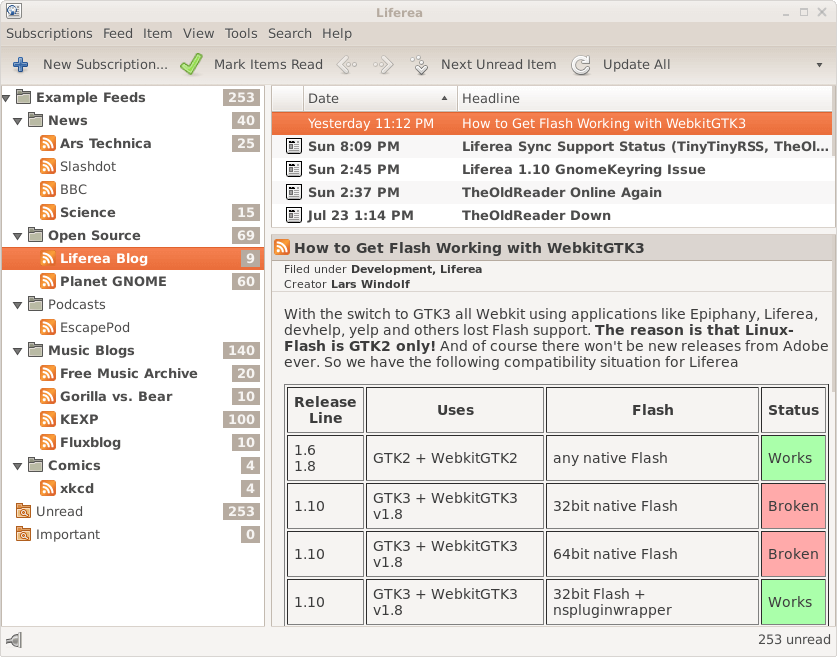
It comes with an embedded graphical browser, supports reading articles while offline, and supports podcasts. It also provides news bins for permanently saving headlines and allows you to match items using search folders. And Liferea can be synchronized with InoReader, Reedah, TheOldReader, and TinyTinyRSS.
To install Liferea on Linux, use the following appropriate command for your specific Linux distribution.
sudo apt install liferea [On Debian, Ubuntu and Mint] sudo yum install liferea [On RHEL/CentOS/Fedora and Rocky/AlmaLinux] sudo emerge -a sys-apps/liferea [On Gentoo Linux] sudo apk add liferea [On Alpine Linux] sudo pacman -S liferea [On Arch Linux] sudo zypper install liferea [On OpenSUSE]
9. OpenTICKR
OpenTickr is a free open-source, highly customizable GTK-based RSS reader that shows feeds in a TICKER bar on your Linux desktop with a fast and smooth scroller. It’s a native Linux program developed using C with GTK+ and Libxml2; it can also run on Windows with MinGW support.
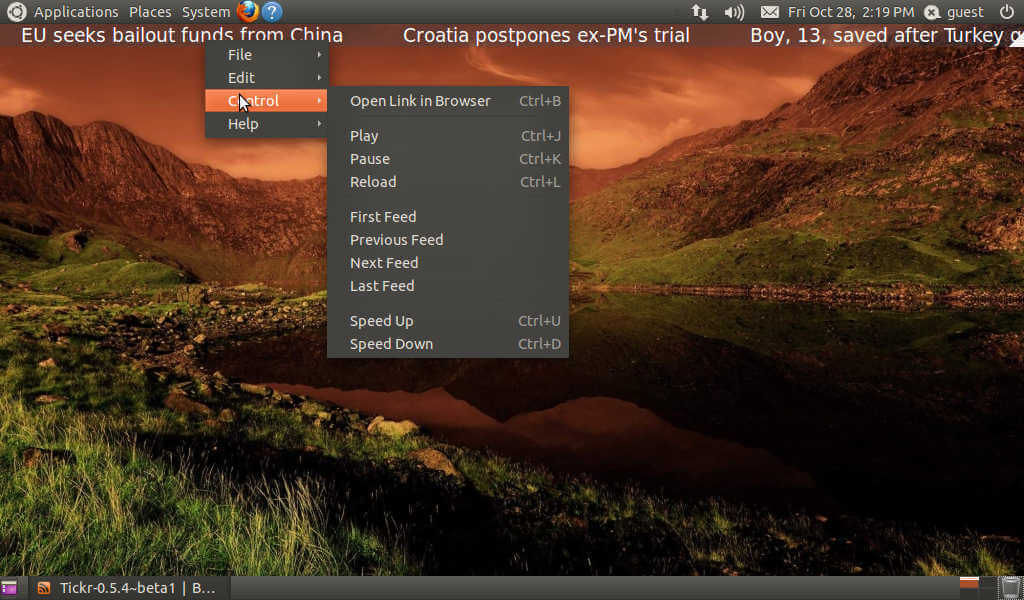
It supports bookmarking of your favorite feeds and allows you to easily play, pause, or reload the current feed. Other than using remote XML resources, you can use it with any text file. In addition, it is highly scriptable, since all its parameters can be passed from the command-line, and much more.
To install OpenTICKR on Linux, use the following appropriate command for your specific Linux distribution.
sudo apt install tickr [On Debian, Ubuntu and Mint] sudo yum install tickr [On RHEL/CentOS/Fedora and Rocky/AlmaLinux] sudo emerge -a sys-apps/tickr [On Gentoo Linux] sudo apk add tickr [On Alpine Linux] sudo pacman -S tickr [On Arch Linux] sudo zypper install tickr [On OpenSUSE]
10. MiniFlux
MiniFlux is a free open-source, very simple, lightweight, and fast RSS/Atom/JSON feed reader, developed in Go and Postgresql. It is easy to install and use and comes with a few useful features. It comes in six languages: Chinese, Dutch, English, French, German, and Polish.

It supports OPML import/export, bookmarks, and categories. For YouTube lovers, it allows you to play videos from channels directly from within the program.
In addition, it supports multiple enclosures/attachments such as videos, music, images as well as podcasts. With it, you can also save articles to external applications or services.
11. Snownews
Snownews is a free open source, simple, lightweight, fast, and fully-featured command-line RSS feed reader for Unix-like systems, with color support.
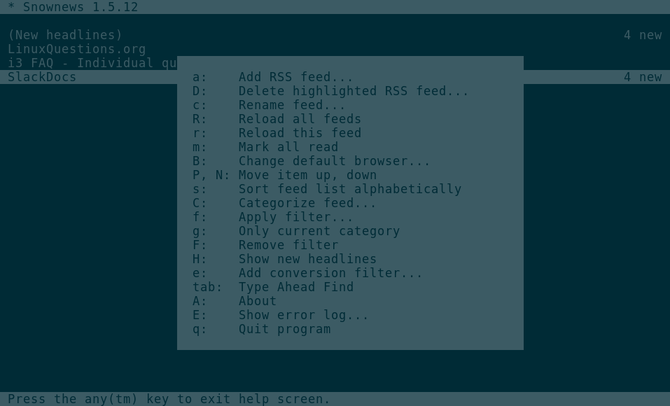
It is a native Unix program written in C and has a few external dependencies (ncurses and libxml2). It comes with an embedded HTTP client which follows server redirects and automatically updates feed URLs that point to permanent redirects (301).
It supports HTTP proxy and authentication (basic and digest methods), feeds categories, OPML import, and uses fully customizable keyboard shortcuts. Snownews also uses a local cache to minimize network traffic, hence boosting its performance.
Furthermore, you can extend it via plug-ins; it is available in several languages and much more.
12. Newsroom
Newsroom is a free open-source, simple, modern, and cross-platform command-line utility to get your favorite news, developed using NodeJS. It runs on Linux systems, Mac OSX as well as Windows.
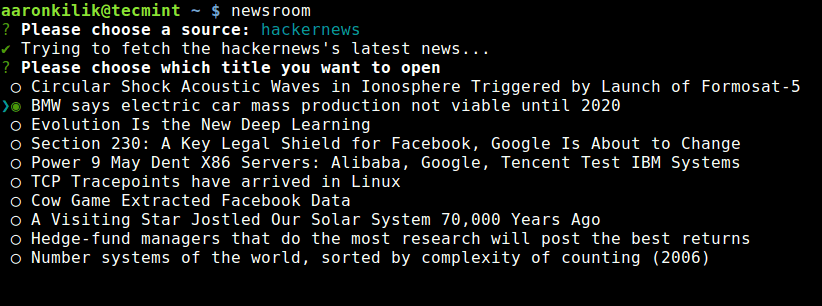
13. Newsboat
Newsboat (a fork of Newsbeuter) is also a free, open-source, and simple terminal-based RSS/Atom feed reader. It only runs on Unix-like systems such as GNU/Linux, FreeBSD, and macOS.
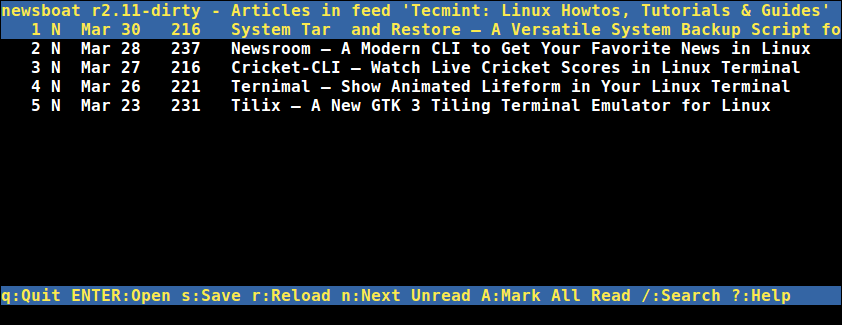
To install Newsboat on Linux, use the following appropriate command for your specific Linux distribution.
sudo apt install newsboat [On Debian, Ubuntu and Mint] sudo yum install newsboat [On RHEL/CentOS/Fedora and Rocky/AlmaLinux] sudo emerge -a sys-apps/newsboat [On Gentoo Linux] sudo apk add newsboat [On Alpine Linux] sudo pacman -S newsboat [On Arch Linux] sudo zypper install newsboat [On OpenSUSE]
14. Fluent Reader
Fluent Reader is a cross-platform modern open-source desktop RSS feed reader created using Electron, React, and Fluent UI. It comes with a modern user interface that supports the import and export of OPML files, backup & restores, regular expression, keyboard shortcuts, and much more.
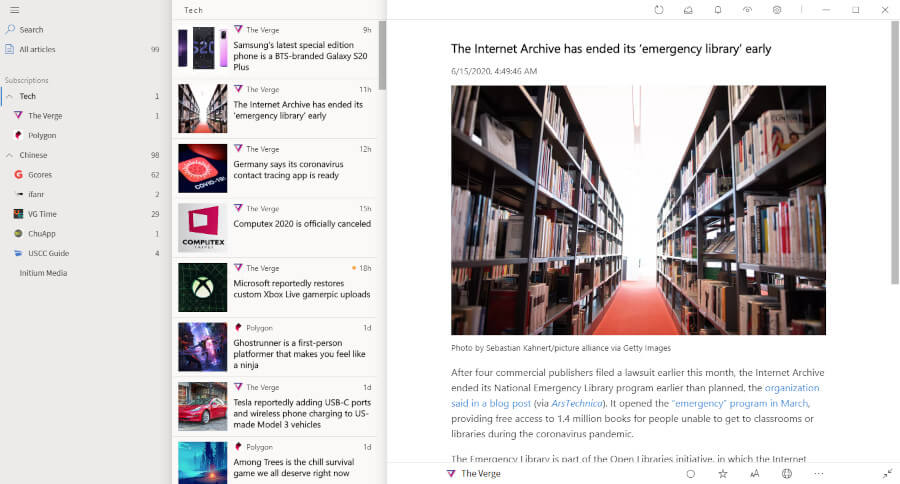
15. Nom – RSS Reader for Terminal
Nom is a command-line RSS feed reader that enhances the reading experience with Glow-styled markdown and a straightforward text-based user interface (TUI) built on Bubbletea.
Key Features include:
- Local synchronization and offline reading support.
- Backend connections with support for miniflux and freshrss.
- Navigation using Vim-style keybindings.
- Additional features like marking feeds as read/unread, filtering, and customizable feed naming.
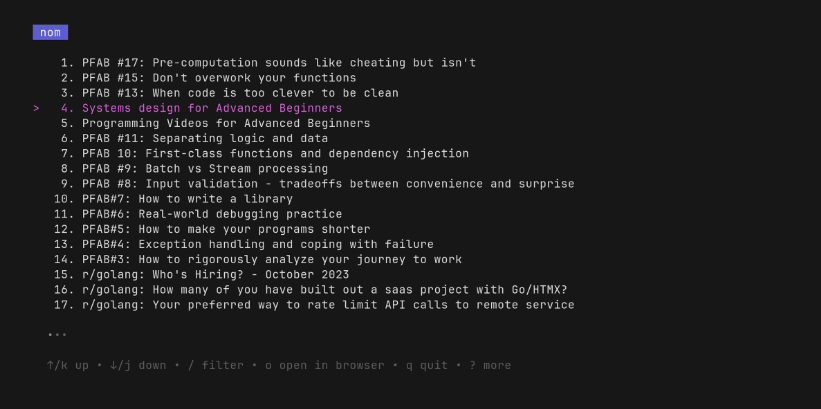
16. GFeeds – News Reader for GNOME
GFeeds is a streamlined RSS/Atom feed reader designed for quick and straightforward use. Its minimalistic interface displays the latest news from your subscriptions.
By default, articles are presented in a web view with disabled JavaScript to ensure a faster and less disruptive user experience. The reader mode, inspired by GNOME Web/Epiphany, is also available.
Feeds supports easy import and export of subscriptions via OPML.
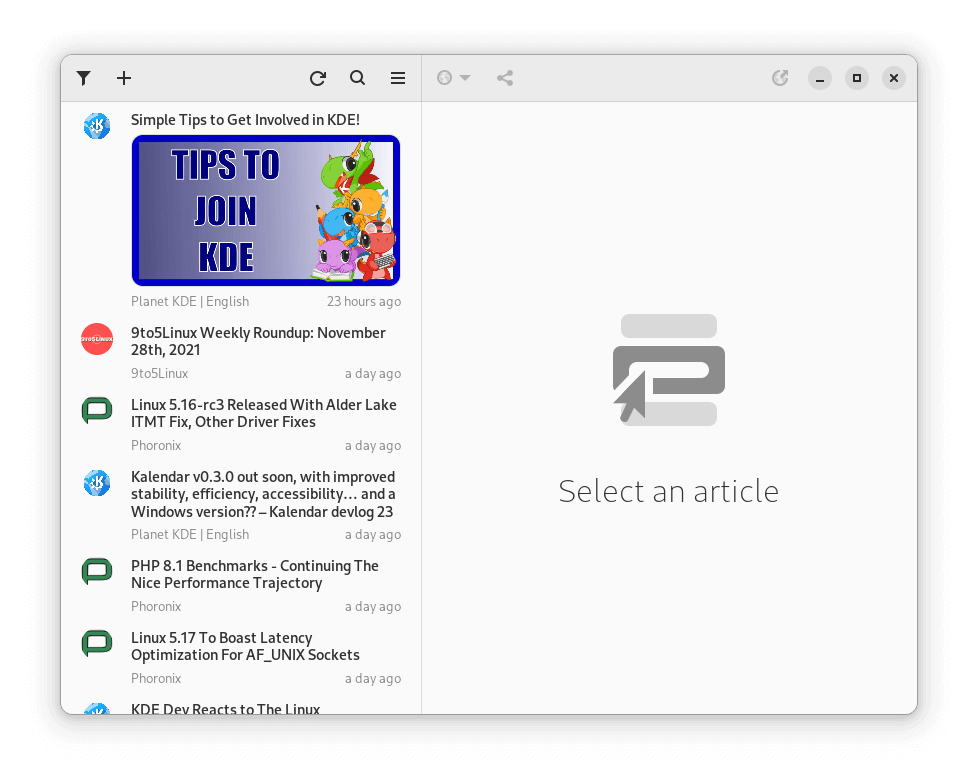
To install GFeeds on Linux, you can use flatpak as shown.
flatpak install flathub org.gabmus.gfeeds flatpak run org.gabmus.gfeeds
17. RSSGuard
RSSGuard is an uncomplicated RSS/ATOM feed reader compatible with Windows, Linux, BSD, OS/2, or macOS. It supports various feed formats such as RSS, ATOM, JSON, and Sitemap.
It also integrates with popular online feed services like Feedly, Gmail, and Google Reader API (including Bazqux, FreshRSS, Inoreader, Miniflux, Reedah, The Old Reader, and more).
Additionally, RSS Guard functions as a podcast player, featuring a built-in media player based on mpv (or ffmpeg), allowing it to play various media content.
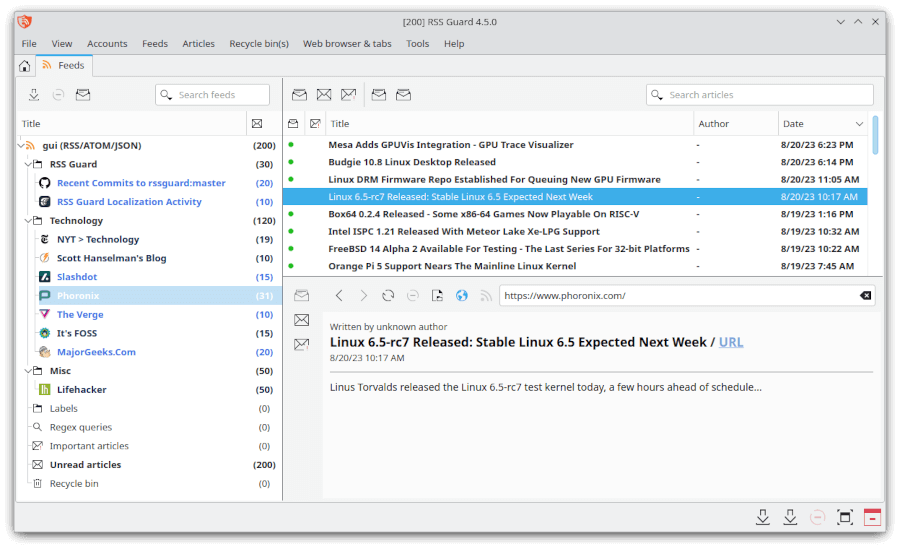
Summary
RSS is a standardized format used to deliver regularly changing content on the web. In this article, we have explained 17 RSS Feed readers for Linux systems. If we have missed any applications in the list above, let us know via the feedback form below.

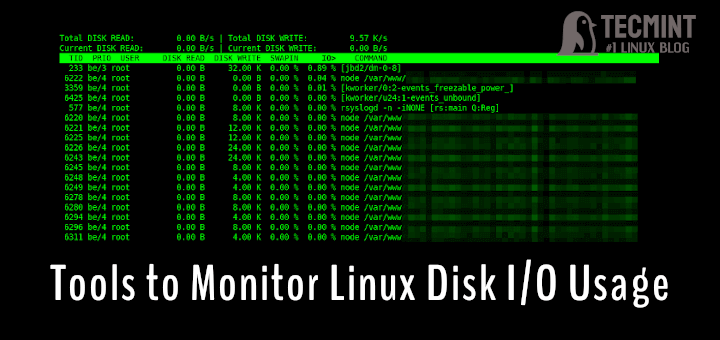
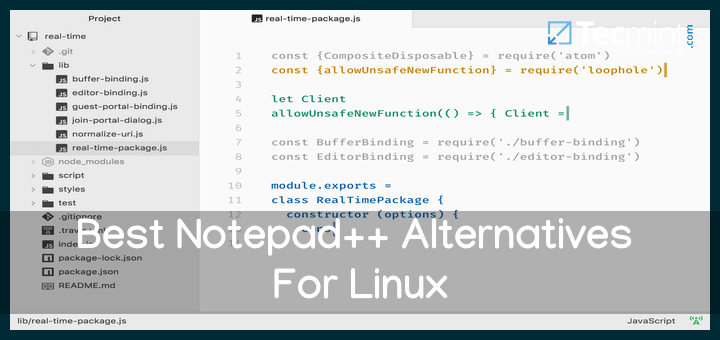

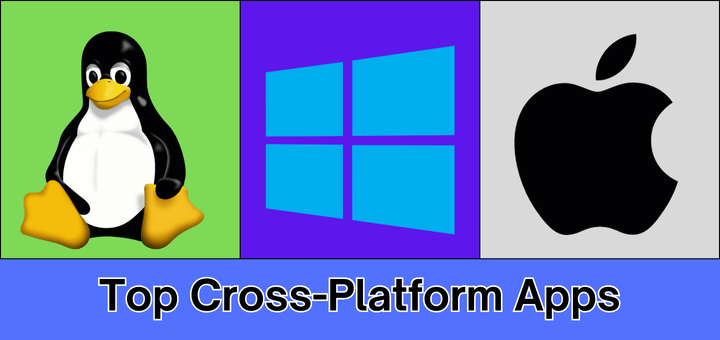
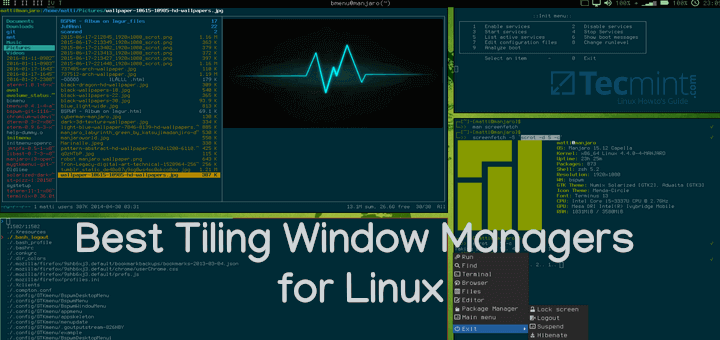

TTRSS is now only supported via a Docker Image. If you repost old article it would be nice to review it entirely before…
@Stef,
Thank you for bringing this to our attention.
Just wanted to let you know that we’ve updated the article with the recent changes…
The Old Reader (theoldreader.com) has been around since 2012. I chose this one because it is close to google reader. Very easy to use and very stable. both free and paid, depending on how many feeds you have. connects with the Daily Feed app on Android.
I’ve been using Tiny Tiny for years since Google Reader services stopped, it’s very usable, easy to update and I can access it everywhere since I configure a small computer at home as a server.
RSS Guard is a simple feed reader, I think you should add it to the list…
You might want to look into commafeed – I think the developers consider it feature-complete.
Fluent Reader is also a better option and should be there in list.
@Slashharsh,
Added Fluent Reader to the list…
News Flash (the spiritual successor to FeedReader) is a modern RSS reader, written in Rust, that should be on the above list.
Check: https://gitlab.com/news-flash/news_flash_gtk
Available as a flatpack: https://flathub.org/apps/details/com.gitlab.newsflash
@Herc,
Added NewsFlash to the list…
Reading RSS for a decade and tried every option in that field.
Feedly is out of reach! Very usable and plugin that search feeds in HTML comes very handy these days when RSS got back to #nerdsonly thing.
You guys shouldn’t be recommending RSSowl, it is unmaintained and apparently with known vulnerabilities.
To instll feedreader, use the following command from terminal.
@Victor
Many thanks for sharing.